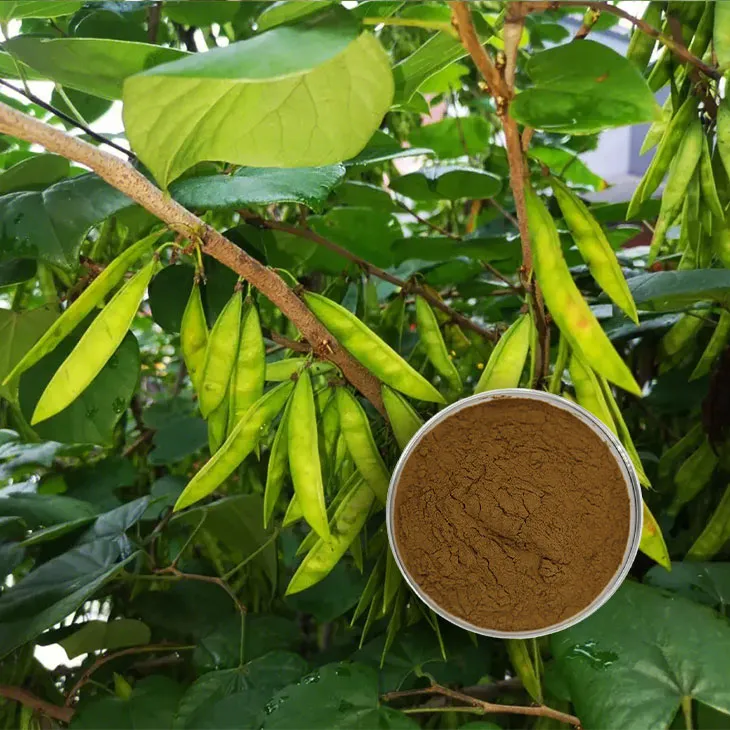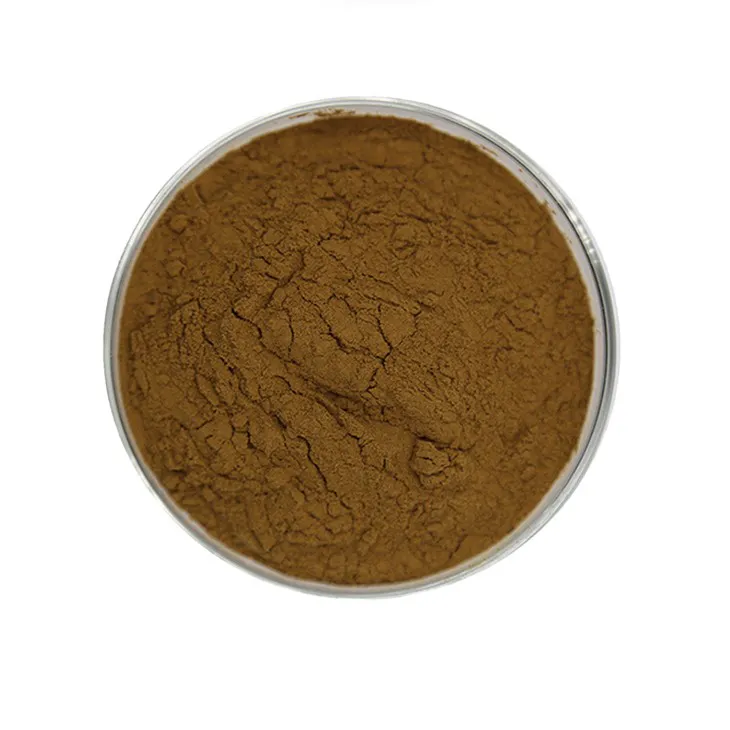- 0086-571-85302990
- sales@greenskybio.com
The Magic of Saponin Extract Powder: A Comprehensive Guide
2024-11-11

Introduction
Saponin Extract powder has emerged as a fascinating and highly valuable substance in various fields. It is a complex mixture of compounds that possess a wide range of properties. Saponins are glycosides, which consist of a sugar part and a non - sugar part called the aglycone. The unique chemical structure of Saponin Extract powder endows it with numerous qualities that have caught the attention of researchers, industries, and traditional medicine practitioners alike.

Unique Characteristics
1. Surface - active Properties
One of the most remarkable features of Saponin Extract powder is its surface - active nature. Saponins can lower the surface tension of liquids, which makes them excellent emulsifiers. This property allows them to mix substances that would otherwise not blend well, such as oil and water. In many industrial applications, this ability to create stable emulsions is highly prized. For example, in the cosmetic industry, saponin - based emulsifiers are used in creams and lotions to ensure that the oily and aqueous components are evenly distributed.
2. Foaming Ability
Saponin extract powder also has a great foaming ability. When agitated in a liquid, saponins can form stable foams. This is due to their ability to reduce the surface tension and trap air bubbles. In the food and beverage industry, this foaming property is utilized in products like beer and soft drinks. The foaming gives these products a desirable appearance and texture, enhancing the consumer's drinking experience.
3. Bitter Taste
Many saponin - containing plants have a bitter taste, and this is also a characteristic of saponin extract powder. The bitter taste can be both a positive and a negative aspect. In some cases, it can act as a natural deterrent to herbivores in plants. In the food industry, while the bitter taste may need to be managed in some applications, in others, it can contribute to a unique flavor profile, such as in certain types of herbal teas.

Uses in the Food and Beverage Industry
Flavor Enhancement
Although saponin extract powder has a bitter taste on its own, when used in moderation, it can enhance the overall flavor of food and beverages. For instance, in coffee substitutes made from certain plants rich in saponins, the saponin content can add a depth and complexity to the flavor that is similar to the bitterness in coffee. In addition, in some traditional fermented foods, saponins can interact with other flavor - forming compounds during the fermentation process, resulting in a more nuanced and interesting flavor.
Functional Properties
1. Antioxidant Activity
Some saponin extract powders have been found to possess antioxidant properties. Antioxidants are important in the food and beverage industry as they can prevent the oxidation of fats and oils, which can lead to rancidity. By adding saponin - based antioxidants to products such as oils or fatty - rich snacks, the shelf - life can be extended. Moreover, antioxidant - rich foods are also considered healthier as they can help combat oxidative stress in the body.
2. Cholesterol - lowering Effects
There is evidence to suggest that certain saponins can have a cholesterol - lowering effect. In the context of the food and beverage industry, this could potentially be incorporated into functional foods or dietary supplements aimed at improving heart health. For example, some plant - based milks that contain saponins may be promoted for their cholesterol - managing properties.

Significance in Traditional Medicine Systems
Traditional medicine systems around the world have long recognized the value of plants containing saponins. In Chinese medicine, for example, certain herbs rich in saponins are used to treat a variety of ailments. Ginseng, which contains saponins known as ginsenosides, is widely used for its adaptogenic properties, which are believed to help the body adapt to stress. In Ayurvedic medicine from India, plants like fenugreek are used. Fenugreek contains saponins that are thought to have hypoglycemic effects, making it useful in the management of diabetes.
In traditional African medicine, various plants with saponin content are used for their anti - inflammatory, analgesic, and antimicrobial properties. These plants are often prepared as decoctions or poultices and applied topically or ingested orally to treat conditions such as skin infections, joint pain, and digestive disorders.

Latest Research in Biotechnology
1. Drug Delivery Systems
Researchers are exploring the use of saponin extract powder in drug delivery systems. Saponins have the potential to be used as carriers for drugs due to their ability to form vesicles. These vesicles can encapsulate drugs and protect them from degradation in the body. Additionally, they can target specific cells or tissues, increasing the efficacy of the drug. For example, some saponin - based vesicles have been studied for their ability to deliver anti - cancer drugs more effectively to tumor cells.
2. Biopesticides
Another area of research is the development of saponin - based biopesticides. Saponins have natural pesticidal properties, being toxic to certain pests while being relatively safe for non - target organisms. They can disrupt the cell membranes of pests, leading to their death. This makes them an attractive alternative to chemical pesticides, which can have harmful effects on the environment and human health. Studies are being conducted to optimize the formulation and application of saponin - based biopesticides.
Future Prospects
The future looks promising for saponin extract powder. In the food and beverage industry, there is potential for further development of functional foods and beverages containing saponins. With the increasing demand for natural and healthy products, saponin - based ingredients could play a significant role.
In the field of medicine, continued research on saponin - based drug delivery systems may lead to the development of more effective and targeted therapies. Additionally, the exploration of saponins in treating chronic diseases such as diabetes and cardiovascular diseases may yield new treatment options.
In biotechnology, the development of saponin - based biopesticides could contribute to more sustainable agriculture. However, there are also challenges to overcome. For example, standardization of saponin extract powder production is needed to ensure consistent quality. Also, more in - depth studies on the safety and long - term effects of saponin - based products are required.
FAQ:
What are the main characteristics of saponin extract powder?
Saponin extract powder has several main characteristics. It is often bitter - tasting. Chemically, it is a type of glycoside. It has surfactant - like properties, which means it can reduce the surface tension of liquids. Saponin extract powder can also form stable foams, which is one of its distinct features.
How does saponin extract powder enhance flavor in the food and beverage industry?
In the food and beverage industry, saponin extract powder can enhance flavor in multiple ways. It can interact with taste receptors on the tongue. For example, in some beverages, it can enhance the perception of bitterness, which can add a complex and interesting flavor profile. It can also help in emulsifying certain components, which can improve the overall mouthfeel and flavor release.
What are the uses of saponin extract powder in traditional medicine?
In traditional medicine systems around the world, saponin extract powder has various uses. In some Asian traditional medicines, it is believed to have anti - inflammatory properties and is used to treat certain skin conditions. In other traditional systems, it is thought to have a positive effect on the digestive system, perhaps by promoting the secretion of digestive enzymes or by helping to soothe the gut lining.
What are the recent research findings on saponin extract powder in biotechnology?
Recent research in biotechnology has shown some interesting findings regarding saponin extract powder. For instance, some studies have explored its potential as an antioxidant. It has also been investigated for its possible role in modulating the immune system at the cellular level. There are also research efforts looking into its use in drug delivery systems, as its surfactant - like properties could potentially be harnessed to improve the delivery of certain drugs.
What are the future prospects of saponin extract powder?
The future prospects of saponin extract powder are quite promising. In the food industry, it may be further developed as a natural flavor enhancer or preservative. In biotechnology, as research continues, it could lead to new drugs or therapies. In the cosmetics industry, it might be used more widely due to its potential skin - friendly properties. However, more research is still needed to fully explore and realize these prospects.
Related literature
- The Properties and Applications of Saponin Extracts in the Modern World"
- "Saponin Extract Powder: Unraveling its Mysterious in Traditional and Modern Sciences"
- "Biotechnological Advances in Saponin Research"
- ▶ Hesperidin
- ▶ Citrus Bioflavonoids
- ▶ Plant Extract
- ▶ lycopene
- ▶ Diosmin
- ▶ Grape seed extract
- ▶ Sea buckthorn Juice Powder
- ▶ Fruit Juice Powder
- ▶ Hops Extract
- ▶ Artichoke Extract
- ▶ Mushroom extract
- ▶ Astaxanthin
- ▶ Green Tea Extract
- ▶ Curcumin
- ▶ Horse Chestnut Extract
- ▶ Other Product
- ▶ Boswellia Serrata Extract
- ▶ Resveratrol
- ▶ Marigold Extract
- ▶ Grape Leaf Extract
- ▶ New Product
- ▶ Aminolevulinic acid
- ▶ Cranberry Extract
- ▶ Red Yeast Rice
- ▶ Red Wine Extract
-
Kelp Extract Powder
2024-11-11
-
Lycopene
2024-11-11
-
Genistein
2024-11-11
-
Andrographis Paniculata Extract Powder
2024-11-11
-
Lemon Extract
2024-11-11
-
Konjac Powder
2024-11-11
-
Grape Seed Extract
2024-11-11
-
Angelica sinensis extract
2024-11-11
-
Cactus Extract
2024-11-11
-
Green Tea Extract
2024-11-11





















